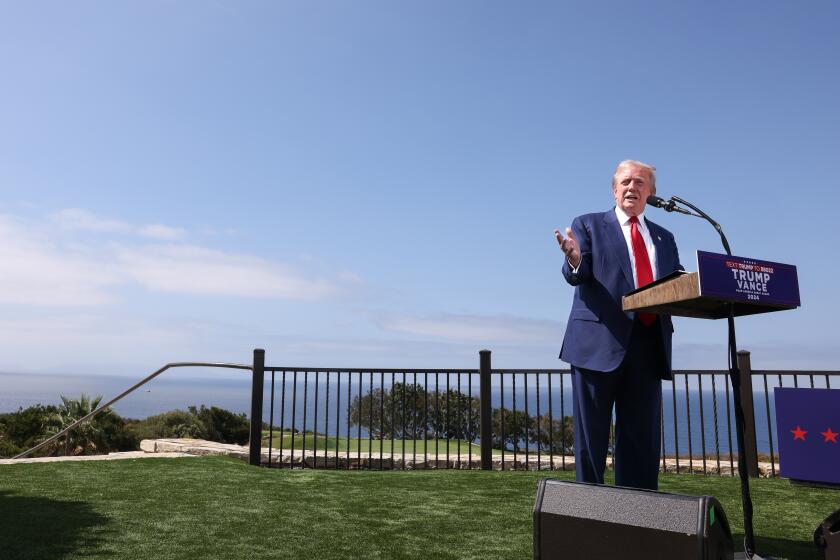45 years of Washington wisdom
When Lee Hamilton arrived in Washington, Lyndon B. Johnson was president and Barack Obama was 3 years old. The moderate Democrat represented Indiana in the House from 1965 until 1999. Then, after rising to the chairmanship of the House Foreign Affairs Committee, Hamilton left Congress and served as co-chairman of the bipartisan 9/11 Commission and president of the Wilson Center, a nonpartisan think tank.
In the polarized Washington of 2010, there aren’t many politicians who win deep respect from both sides of the political divide, but Hamilton has always been able to do that. Now, at 79, he’s heading back to Indiana.
On Tuesday, we sat down to talk about his 45 years in national politics. I wanted to hear whether a wise man who has been a key player in Washington through several cycles of gridlock and cooperation might see any hope on the horizon.
Hamilton’s message: The American political system faces a daunting test in building a national consensus for belt-tightening in both domestic and foreign policy. Congress needs to take actions that many voters will find unpalatable: raising taxes, cutting spending, downsizing our goals. To make it work, leaders of both parties need to become “pragmatic realists” and rediscover the lost art of bipartisan negotiation. And that’s the rub.
“There’s a real, genuine question whether we can make this system work,” he said. “It’s not encouraging in the short run.
“You have very good politicians in Congress, almost by definition; otherwise they wouldn’t be there. And they know that the American people don’t like mean-spirited, excessive partisanship.”
But in a polarized election year, “mean-spirited, tough-minded partisans have a lot of attraction on the ballot.”
The challenge for leaders of both parties, once the election is over, will be to rise to the occasion. “You’re either going to have more gridlock or” — he laughed wryly — “opportunities for statesmanship.”
His advice for President Obama is to “pivot” to the center and find a way to work with Republican leaders, even if they don’t win a majority in the House or Senate. “The Democrats understand they can no longer really control things,” he said of his own party.
The toughest problems facing the nation, he said, don’t have simple answers.
“We consume more than we produce; we spend more than we tax ourselves. We’ve got to right the ship. That means some very difficult decisions.
Ultimately, he said, we’ll have to tax ourselves more and spend less, and that’s a tough sell. What we’ll need, he’s concluded, “is a package deal with two to three dollars in spending cuts for every dollar of tax increases.” That’s a combination — tax increases plus spending cuts — that Obama’s bipartisan deficit commission is considering now.
On foreign policy, Hamilton came to Washington as a supporter of John F. Kennedy’s Cold War liberalism, with its call to “pay any price” to promote freedom around the world. Half a century later, he is a somewhat chastened realist.
“I’ve become keenly aware of the limitations of our power because of our experiences in Iraq and Afghanistan,” he said. “I’ve become more conservative on U.S. military intervention.
“We have to get a much sharper sense of our own capabilities,” he has concluded, of “what price we’re willing to pay.” And, he added, we need to “define our objectives downward” to goals we can realistically achieve.
“If we were to stay in Iraq or Afghanistan for 50 years, we could probably achieve our objectives, but we aren’t going to be there for 50 years,” he said.
The Obama administration has already lowered its goals in Iraq to make possible the withdrawal of most U.S. troops this year. “We are telling ourselves, whether it’s true or not, that we have achieved our objectives,” Hamilton said.
And we are likely to take the same approach in the withdrawal from Afghanistan that is scheduled to begin next year, he added. “We will define our objectives downward.
“I see no likelihood that the Afghan government is going to become a competent government,” he said. “Can we achieve equality of women in Afghanistan? The answer would be no, but we can make some progress.”
Hamilton supported Obama in the 2008 Democratic primaries, was a member of Obama’s foreign policy advisory group during the presidential campaign and was frequently mentioned as a potential secretary of State before Obama chose Hillary Rodham Clinton.
But, like many Democrats, he says Obama’s performance has been a puzzling mix of success and disappointment.
“He’s had remarkable accomplishments from my point of view, but it is quite clear that the American people don’t think that’s enough. They want a president who’s more than a legislative leader. They want someone who gives them hope.... Obama has not yet conveyed that sense of compassion effectively.
“He has lost the connection — which is a nebulous thing — with the American people.”
In foreign policy, Hamilton said: “If you look at all the tough problems he inherited when he came in, he has not solved any of them. There’s been a lack of follow-through on some things.... But it’s much too early to say whether he’s succeeding or not.”
Is he as pessimistic as he sounds? That was a question without an easy answer.
“Every politician gets up and says, ‘I’m an optimist.’ That’s kind of required. You can’t get up and say, ‘I’m a pessimist.’
“We can be pessimistic or optimistic; it doesn’t matter,” he said. “Either way, our duty is the same. Our duty is to make it work.”
doyle.mcmanus@latimes.com
More to Read
Get the L.A. Times Politics newsletter
Deeply reported insights into legislation, politics and policy from Sacramento, Washington and beyond. In your inbox three times per week.
You may occasionally receive promotional content from the Los Angeles Times.











